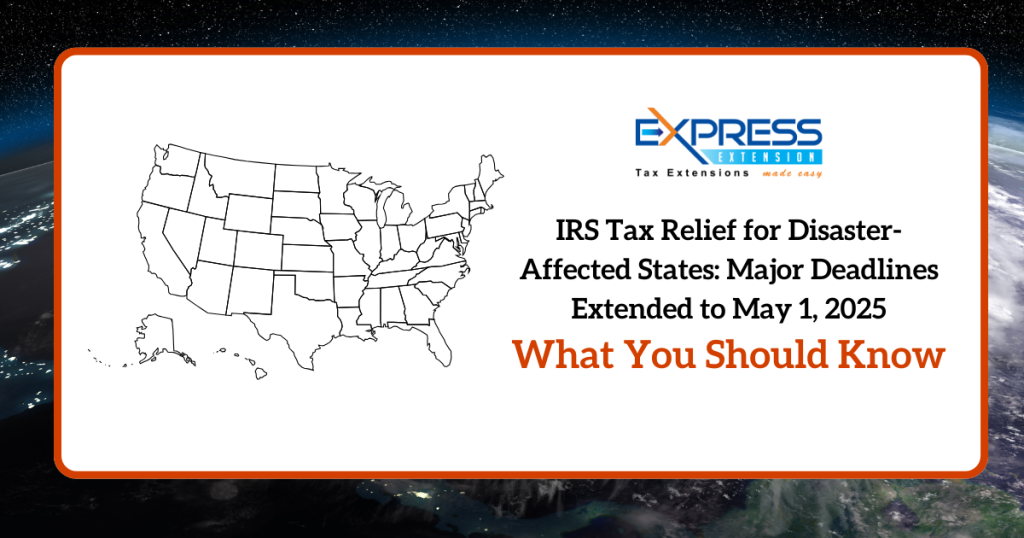IRS Tax Relief for Disaster-Affected States: Major Deadlines Extended to May 1, 2025
reading time: 11 minute(s)

In light of the devastating natural disasters that have affected several states, the Internal Revenue Service (IRS) has announced the extension of tax filing deadlines and the implementation of additional relief measures for individuals and businesses located in the impacted regions.
The IRS disaster-related tax relief is designed to offer essential support to those adversely affected by severe weather events, allowing taxpayers an extended period to fulfill their filing and payment responsibilities without incurring penalties.
Below are the pertinent details regarding the IRS tax relief available to residents and businesses in affected states.
IRS Tax Relief Deadline Extended to May 1, 2025
Due to recent natural disasters, the IRS has extended federal tax filing and payment deadlines for individuals and businesses in several states. For many of these areas, deadlines originally set for March 17 or April 15, 2025, have now been extended to May 1, 2025. This automatic relief applies to affected taxpayers in the following states:
- Alabama: The IRS has granted automatic tax relief to all residents and businesses across Alabama.
- Georgia: The IRS has extended filing and payment deadlines for individuals and businesses throughout Georgia impacted by recent natural disasters.
- Florida: Taxpayers across the state of Florida are eligible for automatic federal tax relief.
- North Carolina: The IRS has provided automatic relief for all taxpayers and entities across North Carolina.
- South Carolina: The IRS has extended federal tax deadlines for all South Carolina taxpayers impacted by declared natural disasters.
- Alaska: Certain areas in Alaska, such as the City and Borough of Juneau, have been designated for IRS disaster relief. These zones offer extended federal deadlines to taxpayers residing or operating within them.
- New Mexico: Taxpayers residing or operating a business in Chaves County, New Mexico, now qualify for federal tax relief.
- Virginia: Taxpayers in specific disaster-designated areas across Virginia now have until May 1, 2025, to file and pay federal taxes. This relief applies to individuals and businesses located in:
- Albemarle, Appomattox, Bedford, Bland, Botetourt, Buchanan, Buckingham, Carroll, Charlotte, Craig, Dickenson, Floyd, Giles, Grayson, Greene, Lee, Madison, Montgomery, Nelson, Patrick, Pittsylvania, Pulaski, Roanoke, Russell, Scott, Smyth, Tazewell, Washington, Wise, Wythe counties, Bristol, Covington, Danville, Galax, Norton, Radford, and Roanoke cities
In addition to these states, the IRS has announced tax relief to several states recently affected by severe storms, tornadoes, straight-line winds, and flooding. Click here to learn about the other disaster-affected states.
Special Relief for Farmers and Fishers
Farmers and fishers who chose to forgo making estimated tax payments by January 2025 now have an extended deadline. The IRS reminds those affected by natural disasters that they have until May 1, 2025, to file and pay taxes without penalties. This extension also applies to farmers and fishers in disaster-affected states like Alabama, Florida, Georgia, North Carolina, South Carolina, and parts of other states, including Kentucky, Alaska, and West Virginia.
Additionally, farmers and fishers who did not make their January estimated payment have until March 3, 2025, to file and pay without penalties. If they have made a payment, they may follow the regular April 15 deadline.
Additional Filing Extensions
Disaster-area taxpayers, including farmers and fishers, who need extra time to file beyond May 1, 2025, can request an extension until October 15, 2025. However, this extension applies only to filing, not to tax payments, which are still due by May 1, 2025.
To ensure timely processing, electronically filed extension requests must be submitted by April 15, 2025. If filing between April 15 and May 1, the request must be made on paper.
Conclusion
These extensions ensure that taxpayers have additional time to file returns and make necessary payments without facing penalties, helping them focus on recovery efforts.
ExpressExtension is here to assist with seamless e-filing, ensuring you meet IRS requirements while taking advantage of disaster relief. Stay informed and stay ahead!

Leave a Comment